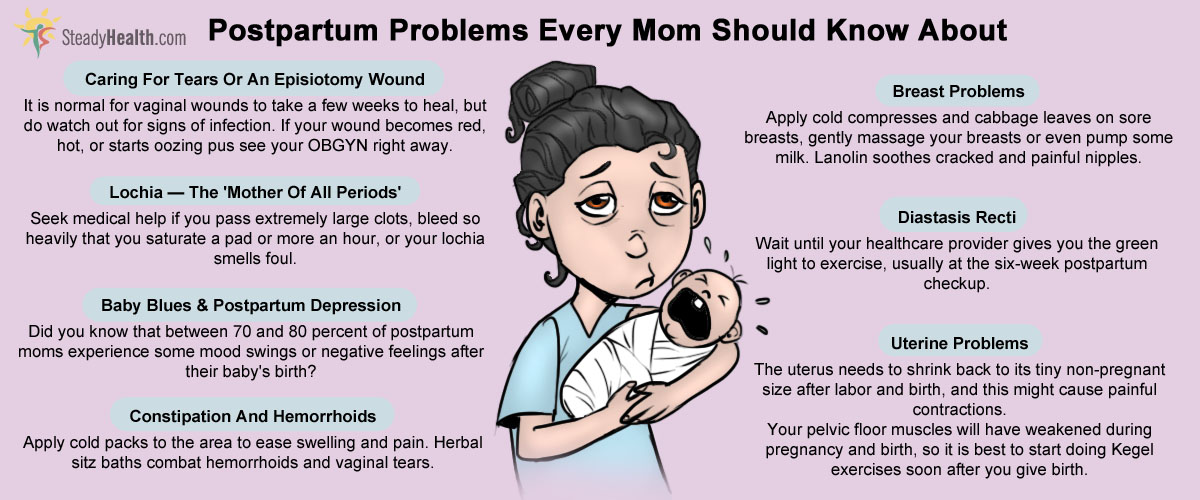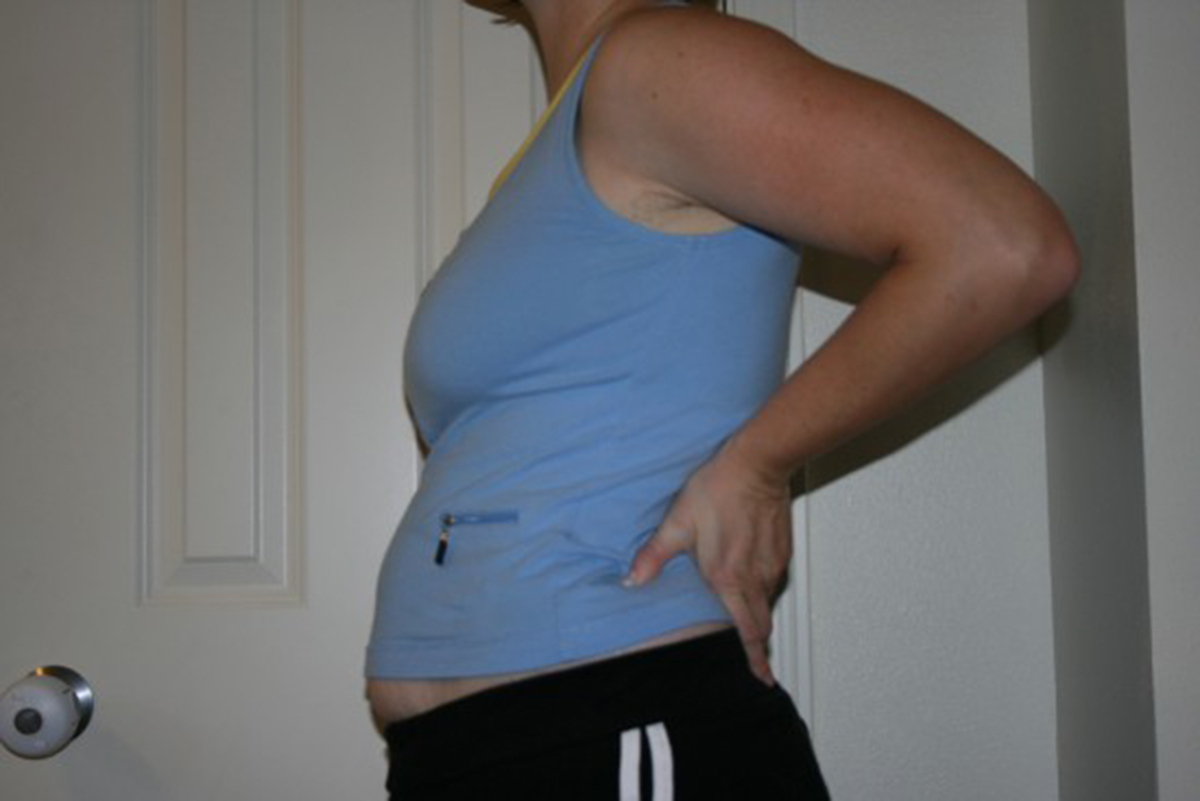You know you can count on your medical team to spot complications during your labor and birth and in the immediate postpartum period, but what happens when you head home? While the danger of truly emergent complications will usually have passed, postpartum problems can still pose a threat.

Caring For Tears Or An Episiotomy Wound
Every woman expects a degree of pain during labor and birth, even if she chooses to have epidural anesthesia. Many women receive an episiotomy — a cut in the vaginal wall — while they are giving birth, and others tear naturally.
Your tears or episiotomy might feel sore, raw and swollen and this might cause you some discomfort during normal activities like sitting or walking in the first few weeks. That is nothing compared to what happens when you urinate though. The burning pain you might feel could well be worse than labor contractions!
Fortunately, there are some steps you can take to feel a lot better. You can use a peri bottle to squirt water onto the area when you use the toilet to dilute your urine and take the sting out of the experience. Cold packs can bring down swelling, and over-the-counter painkillers can help if your pain is disrupting every-day activities.
Lochia — The 'Mother Of All Periods'
Not getting menstrual periods was one of the joys of pregnancy, but your body will make up for what you "missed" after you give birth to your baby. Lochia, the postpartum bleeding that cleans your uterus of remaining tissues, mucus and blood, lasts between four and six weeks. It will be at its heaviest during the first few days of your baby's life and gradually tapers off as the weeks go by.
You should seek medical help if you pass extremely large clots (save them for your OBGYN!), bleed so heavily that you saturate a pad or more an hour, or your lochia smells foul. If your lochia has not stopped yet when you go in for your six-week postpartum checkup, be sure to tell your healthcare provider about it.
Baby Blues Vs Postpartum Depression
New mothers are expected to feel joyous after the birth of a new baby, but this doesn't always happen. Did you know that between 70 and 80 percent of postpartum moms experience some mood swings or negative feelings after their baby's birth?
If you have the "baby blues", you may have unexplained sadness or feel irritated and impatient. The baby blues is thought to be caused by the hormonal fluctuations postpartum women are subject to, along with the sheer exhaustion that results from labor and birth and caring for a baby that wakes up every few hours.
The baby blues is a short-term phenomenon that passes within a few weeks, however, and moms who suffer from it will experience joy and happiness as well as struggling with more negative feelings.
Women who have postpartum depression will find that their emotional state will not lift by itself. Signs of postpartum depression are feelings of hopelessness, constant sadness, emotional numbness, and negative emotions towards themselves and their baby. If you have postpartum depression, you'll lose interest in activities you previously enjoyed, struggle to care for your newborn, and you might withdraw from your loved ones.
Read More: The Best Way To A Speedy Postpartum Recovery
Postpartum depression does not mean you are a bad mother or a horrible person; it is a medical condition that you did not choose. It does not usually go away by itself, so don't be ashamed to seek help if you recognize yourself in the symptoms — especially if you feel you can't take care of your baby or have thoughts of harming yourself or your newborn.
Recognizing And Dealing With More Postpartum Problems
Constipation And Hemorrhoids
Hemorrhoids are varicose veins in the rectal area that can lead to a lot of discomfort. They are not uncommon during pregnancy, when the veins widen and the growing uterus puts pressure on veins that supply the lower body.

Constipation is another problem may pregnant women encounter, but even those who had no problems with it while they were still expecting can find themselves constipated after they give birth. There are several reasons for this. Fasting during labor and birth, pain killers you were given during your labor or postpartum period, and a sore genital area that makes you frightened to have a bowel movement can all contribute.
Both hemorrhoids and constipation will usually go away with a little self-care.
Drink plenty of fluids and make sure there is enough fiber in your diet, and apply cold packs to the area to ease swelling and pain. Herbal sitz baths, which many women like to use for vaginal tears, can also help you combat hemorrhoids. Physical activity, like going for a walk, can help you empty your bowels — and make sure that you take your time on the toilet.
Breast Problems
Some new moms choose to breastfeed, while others don't or can't. Not all postpartum breast problems have an impact on breastfeeding, and women who don't breastfeed can end up with breast issues too. Engorgement has got to be the most common problem women who have just given birth come across.
Your breasts might feel rock hard and tender, or even painful.
This means your breasts are full of milk and you will want to take steps to relieve yourself of some of it. If breastfeeding your baby doesn't make your breasts feel more comfortable, you can gently massage your breasts or even pump some milk. Don't overdo it though, as breastfeeding is a supply-and-demand system — the more milk your body thinks you need, the more you will make. Cold compresses and cabbage leaves can also help you feel more comfortable.
Cracked and painful nipples are another problem you may encounter if you are nursing your little one. Applying lanolin — a natural fat from sheep's wool — regularly should help you overcome that issue in no time.
Mastitis, an infection of breast tissue, is the breast complication every postpartum woman fears. Its tell-tale signs are swelling, pain, redness and warmness in the breasts. Some women also experience fever and chills. Mastitis can be caused by a blocked milk duct or bacteria, and it's unpleasant. The good news is that mastitis doesn't mean you have to wean your baby. A course of antibiotics will clear the infection up, while painkillers can help you feel better.
Diastasis Recti
No woman wants to look pregnant after she had a baby, but most women will not have their old figure back the moment they give birth. Desperate to look the way they did, many new moms are extremely eager to begin exercising. Don't start too soon, though, or you could achieve something very different to what you were aiming for.
As pregnancy progresses, the abdominal muscles will almost always separate to accommodate the growing baby. It takes a while for them to move back into their original place after birth, though, and women who start working out too soon increase their risk of a permanent abdominal-muscle separation known as diastasis recti. Wait until your healthcare provider gives you the green light to exercise, usually at the six-week postpartum checkup... unless you want a belly that permanently looks pregnant.
Uterine Problems
Do you think contractions are behind you once you've had your baby? Don't be fooled — the uterus needs to shrink back to its tiny non-pregnant size after labor and birth, and this might cause painful contractions. Painful contractions are especially likely to show up while you are nursing, and tend to get heavier with each baby a woman has. These contractions are not harmful, but might be very uncomfortable. Over-the-counter painkillers can help out.
More serious uterine problems are also possible.
Women who recognize these symptoms should get in touch with their OBGYN immediately.
Read More: Baby Blues and Postpartum Depression (PPD): Causes and Treatment
This will help prevent a uterine prolapse, where your uterus bulges into the vagina. If you do notice something coming into your vagina from the inside, tell your doctor about it.
- Mindmap by steadyhealth.com
- Photo courtesy of Mrs. Flinger by Flickr : www.flickr.com/photos/mrsflinger/1637058091/

